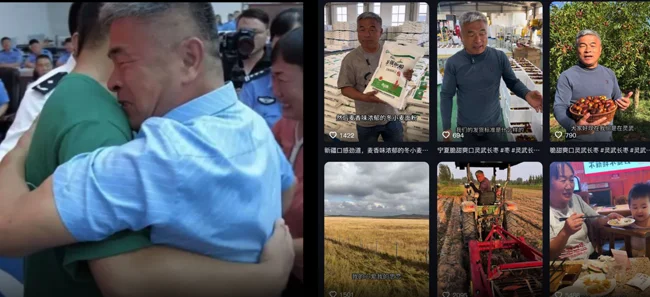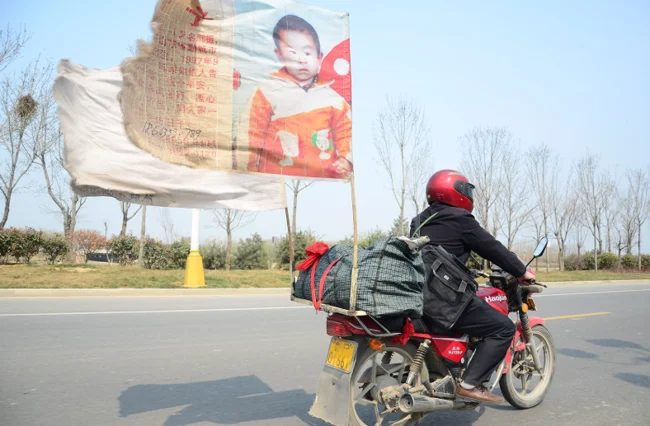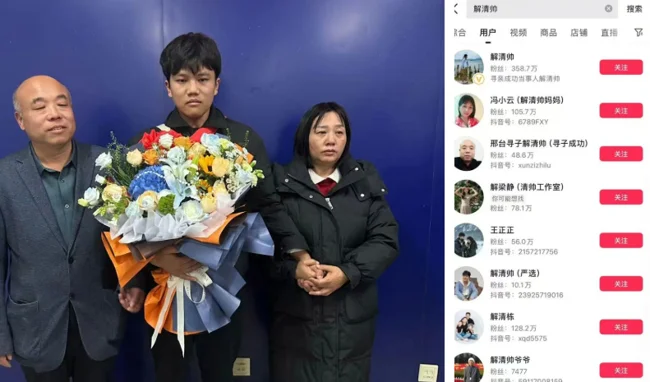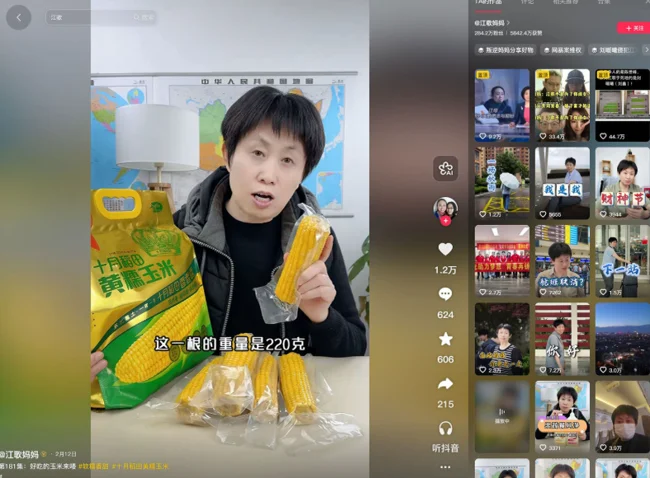Pity shopping: a shameful Chinese trend (8 photos)
Online sales via live streaming are very popular in China. This involves a streamer sitting in front of a camera and putting on makeup, or picking local apples, sorting nuts. Basically, they're selling something in real time, demonstrating the product. 
This is a father who found his son, an incredible story, by the way.
But now this industry has gone very wrong. Chinese live streamers have struck gold – playing on pity. It all comes down to a very old story. A man named Guo Gantang had his son kidnapped (remember the one-child law, the child shortage, the kidnapping of children, especially boys). He spent 24 years riding a motorcycle across China searching for him. His search was so relentless that it cost him 10 motorcycles and inspired a popular film. 
He rode with a flag so everyone would recognize his son.
When father and son were finally reunited in 2021, Guo became a national symbol of grief, resilience, and hard-won hope. And since he already has a reputation (and a son), he now broadcasts live from village fields and farmers' markets, selling sacks of flour or pumpkins to thousands of viewers on social media. And the Chinese are absolutely thrilled. They say it's more sincere than the offers of famous sellers chasing a quick profit. After all, if it's advertising farm products, it's also helping small families. 
For some missing children, the father, mother, and girlfriend all join in the online trading. Grandma's still missing.
But Guo Gantang was just the tip of the iceberg, picked up by streamer after streamer, partly by watching him. For streamers, public sympathy is now more important than admiration. Pity is now garnered by any means necessary. The most popular are parents who have lost their children; they are always empathized with. Next come families who have experienced high-profile tragedies. If they make the news and social media during a tragedy, that's a good thing; recognition drives sales. The mingling of grief and commerce raises difficult questions about the exploitation of real grief and whether trauma can be monetized. Streamers in China have now become the driving force behind the e-commerce market, which grew to 5.8 trillion yuan last year. One of the most prominent streamers in 2023 was Xie, who was kidnapped as an infant back in 1999. He was found by his family in 2023, and that same year he began livestreaming and selling videos. His debut livestream grossed 10 million yuan! After that, every kidnapped and found child began streaming (it's worth noting that found children in China aren't as common as abductions. Perhaps many are simply grown and no longer want to search for their biological parents). It's far more serious that the family of the Chinese student murdered in Japan, or the parents of actor Qiao Renliang, who committed suicide, took up online sales. 
The deceased actor's mother sells vacuum-packed corn
Initially, they built traffic and viewership by sharing stories about their trauma and tragedy. And then, along the way, they started selling something for those who wanted to support them. The viewer feels like they're doing a good deed by buying something, not just buying something they need. In our country, brands aren't very fond of featuring people with emotional stories (unless it's a social story). In China, however, for many brands, someone else's tragedy is a real find. 
The mother of a kidnapped boy is selling summer blankets online!
By helping people grieve and suffer tragedy, companies seem to connect with ordinary people; customers feel part of someone else's story of resilience and endurance. The downside of this sympathy economy is that people follow a streamer for their story, not for the products. Even if they sometimes buy more than from professional advertisers, many quickly tire of the streamer's blatant exploitation of their grief. Their empathy for the tragedy gradually wears thin. And how can you retain such people if you initially lured them in with the trap of grief? But here, everything has already been calculated to get the most out of this kind of streaming. 
Chinese streamers under the bridge, so they can be recommended to wealthy areas by the gemet
Firstly, mothers and middle-aged women remain the most compassionate; they stay on the channel longer. Products should be affordable, ranging from 10 to 100 yuan, so that people can make impulse purchases without having to consider their budget. At the same time, sellers are incredibly fond of such streamers because their audience is less sensitive to inflated prices and reluctant to ask for refunds. It's embarrassing to ask someone who's suffering for a refund! 
A typical Chinese streamer with filters and when they accidentally fell off
Compassion isn't just monetized; it's monetized at inflated prices. But the government is trying to influence streamers through streaming platforms. For example, this year, they blocked tips and sales on Douyin for a number of such "pity" streamers connected to the kidnapping cases that have rocked China. But this is a targeted, targeted measure, not a blanket decree. Meanwhile, these "crybaby" streamers are cutting into the richest online sales, gradually coarsening and freezing people's hearts. 
Cosmetics, creams, all sorts of small items—they sell everything, even fake belly buttons!
This doesn't pose such a serious threat to us; it seems our people are less susceptible to such things. Or am I wrong?
























